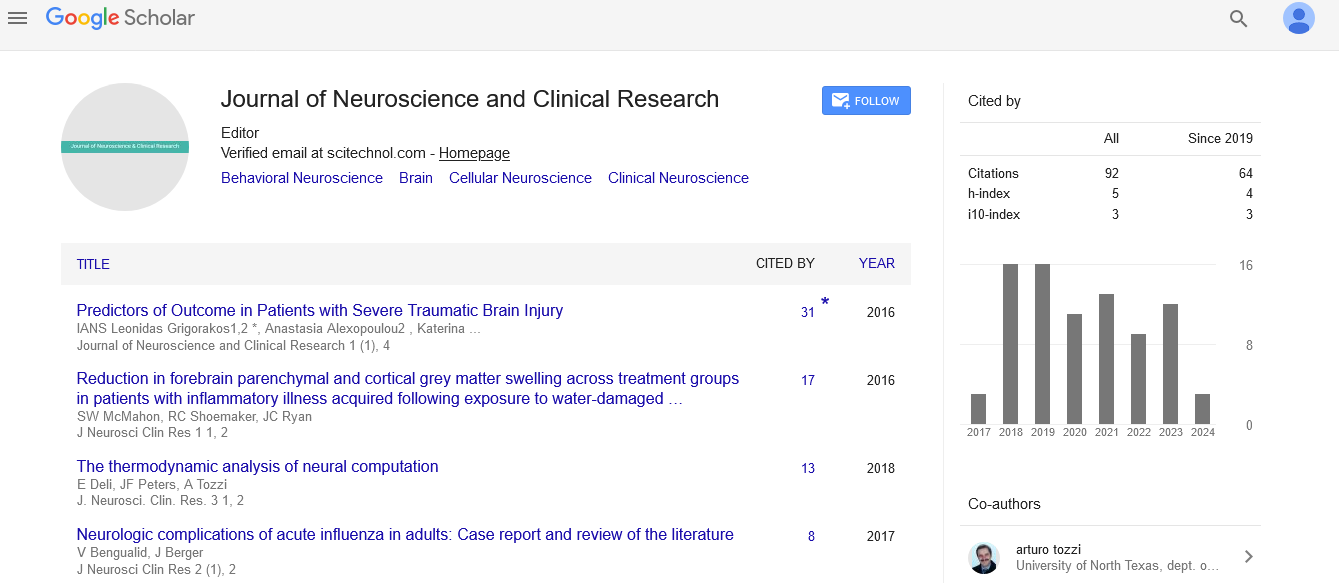Opinion Article, J Neurosci Clin Res Vol: 8 Issue: 2
The Significant Impact of Neurosurgery on Mental Health Recovery
Jennifer Hartmark Hill*
Department of Bioethics & Medical Humanism, University of Arizona College of Medicine, Phoenix, United States of America
*Corresponding Author: Jennifer Hartmark Hill
Department of Bioethics &
Medical Humanism, University of Arizona College of Medicine, Phoenix, United
States of America
E-mail: hilljennifer@gmail.com
Received date: 29 May, 2023, Manuscript No. JNSCR-23-100525;
Editor assigned date: 31 May, 2023, PreQC No. JNSCR-23-100525 (PQ);
Reviewed date: 14 June, 2023, QC No. JNSCR-23-100525;
Revised date: 21 June, 2023, Manuscript No. JNSCR-23-100525 (R);
Published date: 28 June, 2023, DOI: 10.4172/Jnscr.1000153
Citation: Hill JH (2023) The Significant Impact of Neurosurgery on Mental Health Recovery. J Neurosci Clin Res 8:2.
Description
In the realm of medicine, the human brain has always been an enigma, its intricate workings shrouded in mystery. However, recent advancements in the field of neurosurgery have shed light on the profound connection between the mind and the soul. Beyond treating physical ailments, neurosurgery has emerged as a powerful tool for healing the mind and restoring mental well-being. Through various procedures and techniques, neurosurgery has shown remarkable potential for addressing a wide range of mental health disorders, offering hope to those who have long suffered in silence.
Understanding the connection
The relationship between the mind and the brain is undeniable, as the brain serves as the command centre for our thoughts, emotions, and behaviours. Mental health disorders can often be attributed to imbalances or abnormalities within the brain's intricate network of neurons and neurotransmitters. Neurosurgery, traditionally associated with physical ailments like tumours and injuries, has increasingly ventured into the realm of mental health.
Deep Brain Stimulation (DBS)
One of the most promising neurosurgical techniques employed in the treatment of mental health conditions is Deep Brain Stimulation (DBS). In DBS, a neurosurgeon implants a small device called a neurostimulator into specific areas of the brain. This device emits electrical impulses that modulate abnormal neural activity, effectively regulating mood and alleviating symptoms of conditions such as major depressive disorder, obsessive-compulsive disorder, and Parkinson's disease.
DBS has shown remarkable success in cases where other treatments have failed. Patients who once lived in the grip of relentless depression or crippling anxiety have experienced newfound relief and improved quality of life. While the precise mechanisms behind DBS remain under investigation, the profound impact it has had on mental health cannot be overstated.
Neurofeedback and neuromodulation
Beyond DBS, neurosurgery has paved the way for other innovative treatments like neurofeedback and neuromodulation. Neurofeedback allows patients to gain insight into their own brain activity and learn self-regulation techniques through real-time feedback. By promoting awareness and control over brain functions, neurofeedback has demonstrated effectiveness in managing conditions such as Attention Deficit Hyperactivity Disorder (ADHD) and Post-Traumatic Stress Disorder (PTSD).
Neuromodulation techniques, on the other hand, involve the application of magnetic or electrical stimulation to specific brain regions. Transcranial Magnetic Stimulation (TMS) and Transcranial Direct Current Stimulation (TDCS) are examples of neuromodulation techniques used to treat conditions like depression and chronic pain. These non-invasive procedures offer patients alternative treatment options, often with fewer side effects than traditional pharmacological approaches.
Ethical considerations and future directions
While neurosurgery's impact on mental health is undeniably promising, it is important to address the ethical implications of these interventions. Patient autonomy, informed consent, and long-term effects are all areas that warrant careful consideration.
Conclusion
Neurosurgery’s impact on mental health is a remarkable development that holds great promise for those suffering from various psychiatric disorders. Through techniques like deep brain stimulation, neurosurgeons can directly intervene in the brain's neural circuits, offering relief to individuals who have exhausted traditional treatment options. However, cautious optimism and ethical considerations should always guide these interventions. As the field of neurosurgery continues to evolve, collaborative efforts between healthcare professionals, ongoing studies, and advancements in technology will further refine our understanding and application of these innovative techniques.
 Spanish
Spanish  Chinese
Chinese  Russian
Russian  German
German  French
French  Japanese
Japanese  Portuguese
Portuguese  Hindi
Hindi 